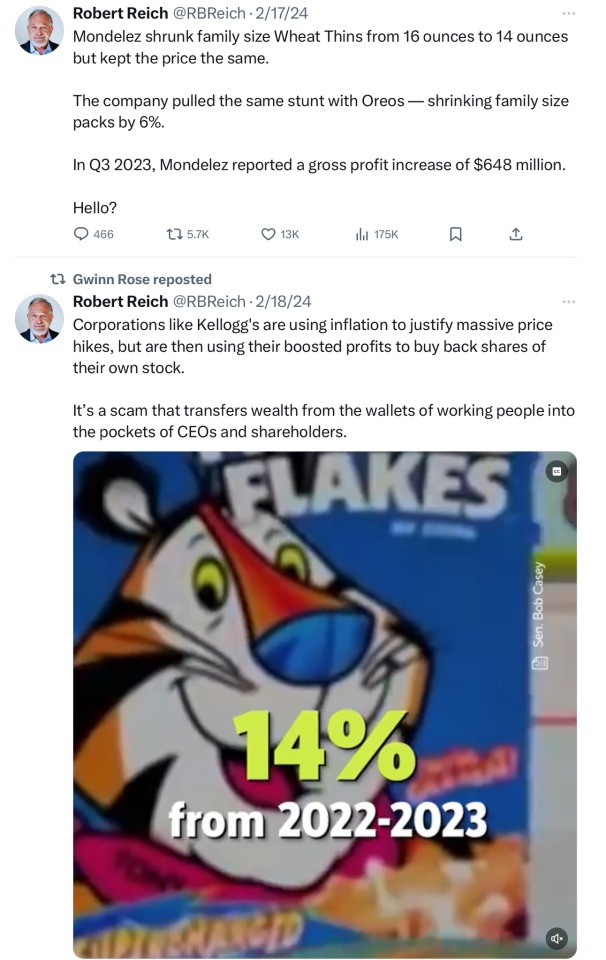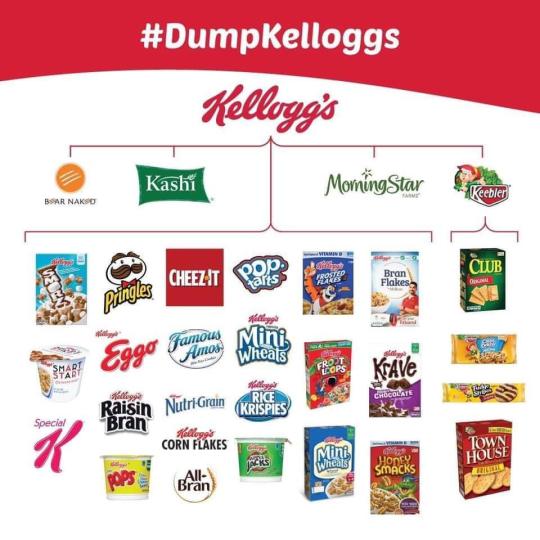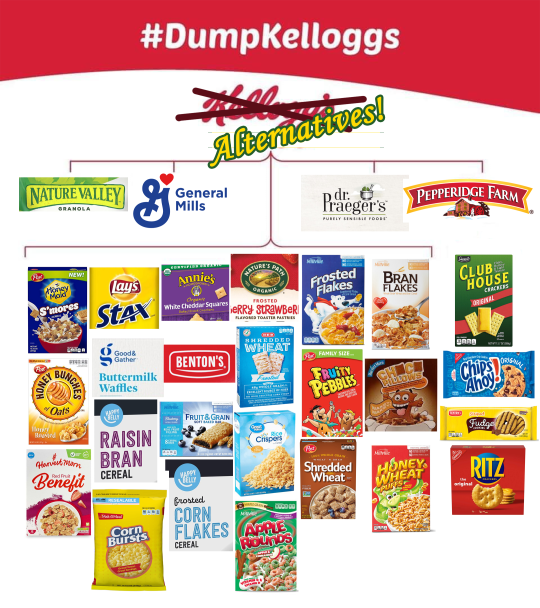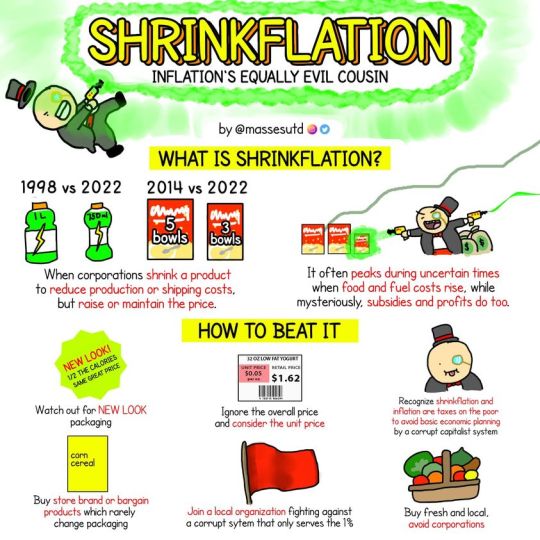#shrinkflation
Text
Shrinkflation
So, I found out a fun fact this last weekend!
Every state has a Department of Weights and Measures. One of their jobs is to make sure that companies are actually selling you the quantities they claim they're selling. For example, this is the department which tests gas pumps and makes sure they're really pumping out a gallon of gas when they charge you for a gallon of gas.
So....
If you happen to, just as an example, notice that your 1lb (16 ounce) box of San Giorgio spaghetti actually only has 10oz of noodles, and you weigh your other boxes of spaghetti to discover they run from 10 to 14 ounces but never the full pound they're supposed to have, and that's why you never seem to have enough pasta for leftovers the next day, then you can report that to the Department of Weights and Measures.
They will want to know where you bought the item, and then will investigate whether the store or the manufacturer is routinely shorting customers. If they do, they will issue a fine to the offending party, you will be eligible for a refund, and under some circumstances lawsuits may follow.
Now, I don't know the outcome of the complaint I just initiated, but they did not want to know specific receipts or times of purchase. Which is good for me as I didn't keep any of those things, at the time I just said "Wow, fuck San Giorgio" and switched brands. But this is still enough to get an inspector out.
5K notes
·
View notes
Text
Things Biden and the Democrats did, this week #10
March 15-22 2024
The EPA announced new emission standards with the goal of having more than half of new cars and light trucks sold in the US be low/zero emission by 2032. One of the most significant climate regulations in the nation’s history, it'll eliminate 7 billion tons of CO2 emissions over the next 30 years. It's part of President Biden's goal to cut greenhouse gas emissions in half by 2030 on the road to eliminating them totally by 2050.
President Biden canceled nearly 6 Billion dollars in student loan debt. 78,000 borrowers who work in public sector jobs, teachers, nurses, social workers, firefighters etc will have their debt totally forgiven. An additional 380,000 public service workers will be informed that they qualify to have their loans forgiven over the next 2 years. The Biden Administration has now forgiven $143.6 Billion in student loan debt for 4 million Americans since the Supreme Court struck down the original student loan forgiveness plan last year.
Under Pressure from the administration and Democrats in Congress Drugmaker AstraZeneca caps the price of its inhalers at $35. AstraZeneca joins rival Boehringer Ingelheim in capping the price of inhalers at $35, the price the Biden Admin capped the price of insulin for seniors. The move comes as the Federal Trade Commission challenges AstraZeneca’s patents, and Senator Bernie Sanders in his role as Democratic chair of the Senate Health Committee investigates drug pricing.
The Department of Justice sued Apple for being an illegal monopoly in smartphones. The DoJ is joined by 16 state attorneys general. The DoJ accuses Apple of illegally stifling competition with how its apps work and seeking to undermining technologies that compete with its own apps.
The EPA passed a rule banning the final type of asbestos still used in the United States. The banning of chrysotile asbestos (known as white asbestos) marks the first time since 1989 the EPA taken action on asbestos, when it passed a partial ban. 40,000 deaths a year in the US are linked to asbestos
President Biden announced $8.5 billion to help build advanced computer chips in America. Currently America only manufactures 10% of the world's chips and none of the most advanced next generation of chips. The deal with Intel will open 4 factories across 4 states (Arizona, Ohio, New Mexico, and Oregon) and create 30,000 new jobs. The Administration hopes that by 2030 America will make 20% of the world's leading-edge chips.
President Biden signed an Executive Order prioritizing research into women's health. The order will direct $200 million into women's health across the government including comprehensive studies of menopause health by the Department of Defense and new outreach by the Indian Health Service to better meet the needs of American Indian and Alaska Native Women. This comes on top of $100 million secured by First Lady Jill Biden from ARPA-H.
Democratic Senators Bob Casey, Tammy Baldwin, Sherrod Brown, and Jacky Rosen (all up for re-election) along with Elizabeth Warren, Cory Booker, and Sheldon Whitehouse, introduced the "Shrinkflation Prevention Act" The Bill seeks to stop the practice of companies charging the same amount for products that have been subtly shrunk so consumers pay more for less.
The Department of Transportation will invest $45 million in projects that improve Bicyclist and Pedestrian Connectivity and Safety
The EPA will spend $77 Million to put 180 electric school buses onto the streets of New York City This is part of New York's goal to transition its whole school bus fleet to electric by 2035.
The Senate confirmed President Biden's nomination of Nicole Berner to the Court of Appeals for the Fourth Circuit. Berner has served as the general counsel for America's largest union, SEIU, since 2017 and worked in their legal department since 2006. On behalf of SEIU she's worked on cases supporting the Affordable Care Act, DACA, and against the Defense of Marriage act and was part of the Fight for 15. Before working at SEIU she was a staff attorney at Planned Parenthood. Berner's name was listed by the liberal group Demand Justice as someone they'd like to see on the Supreme Court. Berner becomes one of just 5 LGBT federal appeals court judges, 3 appointed by Biden. The Senate also confirmed Edward Kiel and Eumi Lee to be district judges in New Jersey and Northern California respectively, bring the number of federal judges appointed by Biden to 188.
#Thanks Biden#Joe Biden#Democrats#politics#US politics#climate change#climate crisis#student loans#debt forgiveness#shrinkflation#women's health#drug prices
445 notes
·
View notes
Text

#shrinkflation#corporate greed#republican assholes#maga morons#never trump#traitor trump#crooked donald
213 notes
·
View notes
Text
So, Kellogg's Boycott. Again.
Haven't seen any posts about it here yet, so figured I'd make one.
In short: We're all tired of these big companies gouging their prices just because they can, and calling it 'inflation.' We're tired of companies announcing record profits while they cut bonuses/lay people off/force workers to run on skeleton crews/etc. We're tired of "Shrinkflation" And we're tired of a bunch of other shit too, but you get my point.
So, vote with your wallet.
On April 1st, stop buying Kellogg's, and keep that up until June 30th. Just three months- just one quarter of the fiscal year. Companies report earnings each quarter, and if their earnings drop it will reflect in these quarterly reports.
Why Kellogg's?
Because their CEO recently pulled a "Let them eat cake."
TLDR; Kellogg's has raised prices by 28% across the board, bragged about record breaking profits, and then suggested that families struggling to afford groceries, because of aforementioned price gouging, just "eat cereal for dinner!"
And well, that message was not well received by anyone, as one could imagine. Pissed a lot of people off.
So yeah. The plan is to stop buying any Kellogg's products (below) for the entirety of the second quarter (April 1st-June 30th) and to collectively tell Kellogg to fuck off until they lower their prices.
The goal isn't to "destroy the company" or cost anyone their jobs- but we will hit them where they will listen. Their profits.
If they don't listen, then we don't come back, and we start in on the next company, and keep going until they all get the message.
There's always alternatives (more on that below) and we don't need them. If they refuse to drop their prices, then we just stick with the alternatives we found.


Three months is a minor inconvenience to teach a corporation a lesson, and we can do it.
So, take this month before April to find your alternatives. If you need help, I based a non-comprehensive list (below) off the image above. There's tons more just a google search away, and I bet others have made lists as well.
There's also always the option to make your own. There's tons of recipes online showing how to make dupes of your favorite products.

Some things to note:
Don't go stocking up on your favorite Kellogg's products the last week of March and think you're not crossing the picket line. The point is to make Kellogg's feel the loss in profits, and stocking up on Cheez-its beforehand will defeat the purpose. I sincerely promise you can make it three months without buying Kellogg's. Again, three months is a minor inconvenience to teach a corporation a lesson, and we can do it.
That said, Safe Foods are acknowledged. If you or your child is neurodivergent and has issues with food (i.e: literally won't be won't be able to eat at all without their safe food) you get a pass. By all means feel free to try and find alternatives, but it's very unlikely that the few who can't boycott will cause it to fail. There should be plenty of the rest of us to pick up the slack.
Don't be a bystander- meaning don't go about this thinking "Oh, well surely there's enough people boycotting that it's fine if I just-" No. If we ever want things to change then we need to be strong enough to do even something as small as not buying something we like for three months. Furthermore, it's on those of us who can afford Kellogg's products to boycott Kellogg's. It's not the responsibility of those who already can't afford Eggos to boycott Eggos. Nothing will change if you go about just assuming everyone else already has it handled for you. Take a stand.
And importantly, Spread the word. This only works if we let as many people as possible know about it.
So reblog this post, or make your own post, or both. Even feel free to copy and paste this entire post off-platform if you need to. I've also seen some suggest making flyers, or even just writing on post-it notes, and sticking them to Kellogg's products in the store to spread the word off-line.
Just get the word out there. If we ever want these companies to stop gouging us for every cent we've earned, then we have to make a stand somewhere.
If we do nothing it will only ever get worse.
#kelloggs boycott 2024#kelloggs#kelloggs boycott#corporate greed#boycott#eat the rich#ceo#let them eat cake#let them eat flakes#“Fuck you. Fools” day#fuck corporations#fuck capitalism#wendys#shrinkflation#price gouging#kelloggs ceo
127 notes
·
View notes
Text
#shrinkflation#corporate greed#greedflation#vote blue#vote democrat#vote blue 2024#vote democratic#vote blue to save democracy#vote biden#ffs vote blue#democrats#social democracy#democracy#democratic socialism#democrats now socialism later#biden/harris 2024
93 notes
·
View notes
Photo

3K notes
·
View notes
Text
Rural towns and poor urban neighborhoods are being devoured by dollar stores

Across America, rural communities and big cities alike are passing ordinances limiting the expansion of dollar stores, which use a mix of illegal predatory tactics, labor abuse, and monopoly consolidation to destroy the few community grocery stores that survived the Walmart plague and turn poor places into food deserts.
If you'd like an essay-formatted version of this post to read or share, here's a link to it on pluralistic.net, my surveillance-free, ad-free, tracker-free blog:
https://pluralistic.net/2023/03/27/walmarts-jackals/#cheater-sizes
"The Dollar Store Invasion," is a new Institute For Local Self Reliance (ILSR) report by Stacy Mitchell, Kennedy Smith and Susan Holmberg. It paints a detailed, infuriating portrait of the dollar store playback, and sets out a roadmap of tactics that work and have been proven in dozens of places, rural and urban:
https://cdn.ilsr.org/wp-content/uploads/2023/01/ILSR-Report-The-Dollar-Store-Invasion-2023.pdf
The impact of dollar stores is plainly stated in the introduction: "dollar stores drive grocery stores and other retailers out of business, leave more people without access to fresh food, extract wealth from local economies, sow crime and violence, and further erode the prospects of the communities they target."
This new report builds on ILSR's longstanding and excellent case-studies, augmenting them with the work of academic geographers who are just starting to literally map out the dollar store playbook, identifying the way that a dollar stores will target, say, the last grocery store in a Black neighborhood and literally surround it, like hyenas cornering weakened prey. This tactic is repeated whenever a new grocer opens in the neighborhood: dollar stores "carpet bomb" the surrounding blocks, ensuring that the new store closes as quickly as it opens.
One important observation is the relationship between these precarious neighborhood grocers and Walmart and its other big-box competitors. Deregulation allowed Walmart to ring cities with giant stores that relied on "predatory buying" (wholesale terms that allowed Walmart to sell goods more cheaply than its competitors bought them, and also rendered its suppliers brittle and sickly, and forced down the wages of those suppliers' workers). This was the high cost of low prices: neighborhoods lost their local grocers, and community dollars ceased to circulate in the community, flowing to Walmart and its billionaire owners, who spent it on union busting and political campaigns for far-right causes, including the defunding of public schools.
This is the landscape where the dollar stores took root: a nation already sickened by an apex predator, which left a productive niche for jackals to pick off the weakened survivors. Wall Street loved the look of this: the Private equity giant KKR took over Dollar General in 2007 and went on a acquisition and expansion bonanza. Even after KKR formally divested itself of Dollar General, the company's hit-man Michael M Calbert stayed on the board, rising to chairman.
The dollar store market is a duopoly. Dollar General's rival is Dollar Tree, another gelatinous cube of a company that grew by absorbing many of its competitors, using Wall Street's money. These acquisitions are now notorious for the weaknesses they exposed in antitrust practice. For example, when Dollar Tree bought Family Dollar, growing to 14,000 stores, the FTC waved the merger through on condition that the new business sell off 330 of them. These ineffectual and pointless merger conditions are emblematic of the inadequacy of antitrust as it was practiced from the Reagan administration until the sea-change under Biden, and Dollar Tree/Family Dollar is the poster child for more muscular enforcement.
The duopoly has only grown since then. Today, Dollar General and Dollar Tree have more than 34,000 US outlets - more than Starbucks, #Walmart, McDonalds and Target - combined.
Destroying a community's grocery store rips out its heart. Neighborhoods without decent access to groceries impose a tax on their already-struggling residents, forcing them to spend hours traveling to more affluent places, or living off the highly processed, deceptively priced (more on this later) goods for sale on the dollar store shelves.
Take Cleveland, once served by a small family chain called Dave's Market that had served its communities since the 1920s. Dave's store in the Collinwood neighborhood was targeted by Family Dollar and Dollar General, which opened seven stores within two miles of the Dave's outlet. The dollar stores targeted the only profitable part of Dave's business - the packaged goods (fresh produce is a money-loser, subsidized by packaged good).
The dollar stores used a mix of predatory buying and "cheater sizes" (packaged goods that are 10-20% smaller than those sold in regular outlets, which are not available to other retailers) to sell goods at prices that Dave's couldn't match, driving Dave's out of business.
Typical dollar stores stock no fresh produce or meat. If your only grocer is a dollar store, your only groceries are highly processed, packaged foods, often sold in deceptive single-serving sizes that actually cost more per ounce than the products that the defunct neighborhood grocer once sold.
Dollar stores don't just target existing food deserts - they create them. Dollar stores preferentially target Black and brown neighborhoods with just a single grocer and then they use predatory pricing (subsidizing the cost of goods and selling them at a loss) and predatory buying to force that grocery store under and tip the neighborhood into food desert status.
Dollar stores don't just target Black and brown urban centers; they also go after rural communities. The commonality here is that both places are likely to be served by independent grocers, not chains, and these indies can't afford a pricing war with the Wall Street-backed dollar store duopoly.
As mentioned, the "predatory buying" of dollar stores is illegal - it was outlawed in 1936 under the Robinson-Patman Act, which required wholesalers to offer goods to all merchants on the same terms. 40 years ago, we stopped enforcing those laws, leading the rise and rise of big box stores and the destruction of the American Main Street.
The lawmakers who passed Robinson-Patman knew what they were doing. They were aware of what contemporary economists call "the waterbed effect," where wholesalers cover the losses from their massive discounts to major retailers by hiking prices on smaller stores, making them even less competitive and driving more market consolidation.
When dollar stores invade your town or neighborhood, they don't just destroy the food choices, they also come for neighborhood jobs. Where a community grocer typically employs 12 or more people, Dollar General employs about 8 per store. Those workers are paid less, too: 92% of Dollar General's workers earn less than $15/h, making Dollar General the worst employer of the 66 large service-sector firms.
Dollar stores also lean heavily into the tactic of turning nearly every role at its store into a "management" job, because managers aren't entitled to overtime pay. That's how you can be the "manger" of a dollar store and take home $40,000 a year while working more than 40 hours every single week.
Understaffing stores turns them into crime magnets. Shootings at dollar stores are routine. Between 2014-21, 485 people were shot at dollar stores - 156 of them died. Understaffed warehouses are vermin magnets. In the Eastern District of Arkansas, Family Dollar was subpoenaed after a rat infestation at its distribution centers that contaminated the food, medicines and cosmetics at 400 stores.
The ILSR doesn't just document the collapse of American communities - it fights back, so this report ends with a lengthy section on proven tactics and future directions for repelling the dollar store invasion. Since 2019, 75 communities have blocked proposals for new dollar stores - more than 50 of those cases happened in 2021/22.
54 towns, from Birmingham, AB to Fort Worth, TX to Kansas City, KS, have passed laws to "sharply restrict new dollar stores, typically by barring them from opening within one to two miles of an existing dollar store."
To build on this momentum, the authors call for a "reinvigoration of antitrust laws," especially the Robinson-Patman Act. Banning predatory buying would go far to creating a level playing field for independent grocers hoping to fight off a dollar store infestation.
Further, we need the FTC and Department of Justice Antitrust Divition to block mergers between dollar-store chains and unwind the anticompetitve mergers that were negligently waved through under previous administrations (thankfully, top enforcers like Jonathan Kantor and Lina Khan are on top of this!).
We need to free up capital for community banks that will back community grocers. That means rolling back the bank deregulation of the 1980s/90s that allowed for bank consolidation and preferential treatment for large corporations, while reducing lending to small businesses and destroying regional banks. Congress should cap the market share any bank can hold, break up the biggest banks, and require banks to preference loans for community businesses. We also need to end private equity and Wall Street's rollup bonanza.
All of that sounds like a tall order - and it is! But the good news is that it's not just groceries at stake here. Every kind of community business, from pet groomers to hairdressers to funeral homes, falls into the antitrust "Twilight Zone," of acquisitions under $101m. With 60% of Boomer-owned businesses expected to sell in the coming decade, 2.9m businesses employing 32m American workers are slated to be gobbled up by private equity:
https://pluralistic.net/2022/12/16/schumpeterian-terrorism/#deliberately-broken
Whether you're burying a loved one, getting dialysis, getting your cat fixed or having your dog's nails trimmed, you are already likely to be patronizing a business that has been captured by private equity, where the service is worse, the prices are higher and the workers earn less for harder jobs. Everyone has a stake in financial regulation. We are all in this fight, except for the eminently guillotineable PE barons, and you know, fuck those guys
At the state level, the authors propose new muscular enforcement regimes and new laws to protect small businesses from unfair competition. They also call on states to increase the power of local governments to reject new dollar store applications, amending land use guidelines to require "cultivating net economic growth, ensuring that everyone has access to healthy food, and protecting environmental resources.
If all of this has you as fired up as it got me this morning, check out ILSR's "How to Stop Dollar Stores in Your Community" resources:
http://ilsr.org/dollar-stores
I’m kickstarting the audiobook for my next novel, a post-cyberpunk anti-finance finance thriller about Silicon Valley scams called Red Team Blues. Amazon’s Audible refuses to carry my audiobooks because they’re DRM free, but crowdfunding makes them possible.

Image:
Mike McBey (modified)
https://www.flickr.com/photos/158652122@N02/38893547595/
CC BY 2.0
https://creativecommons.org/licenses/by/2.0/
[Image ID: A ghost town; it is towered over by a haunted castle with a Dollar General sign on it, with the shadow of Count Orlock cast over its tower. One of its turrets is being struck by lightning.]
#pluralistic#shrinkflation#institute for local self reliance#ilsr#dollar tree#dollar general#dollar stores#groceries#food deserts#kkr#pe#private equity#predatory buying#predatory pricing#Robinson-Patman Act#consolidation#monopoly#monopsony#care labor
184 notes
·
View notes
Text

I can’t be too mad. It was marked down to $2.
But there’s more plastic (and air) than chocolate.
22 notes
·
View notes
Text
shrinkflation is getting out of hand. the “family size” bag of Munchies snack mix is now smaller than the regular size used to be. the Campbell's Chunky Soup cans aren't even chunky anymore. cereal is $5-6 and the box is practically a DVD case. I shit you not, I almost bought a box of cereal the other day that was 250 grams (for the USAmericans that's less than 9 ounces). where will it stop
143 notes
·
View notes
Text
i hate when food conglomerates introduce something delicious but then destroy it in time, like how timtams have a thinner coating of chocolate now, and those liquid-inner gummy lollies now have a solid base that takes over half the shape so the liquid part is practically non-existent, and hershey swapping cocoa butter for 'cheaper oil substitutes' which gives the chocolate a sickening non-chocolatey taste and texture, and pringles are thinner and smaller with less flavour, and cadbury changing the recipe for creme eggs so it tastes medicinal and swapping the milk chocolate for 'standard cocoa mix' so even the most basic component is a letdown. customers pay the price while shareholders benefit and ceos rake in millions. we lose these treats of comforting indulgence so some 1% can buy another yacht. i hate shrinkflation.
42 notes
·
View notes
Text
The Biden administration is trying to limit junk fees. The president made reference to this during the State of the Union speech on Thursday. Of course Republicans think junk fees and screwing the consumer are great.
The Consumer Financial Protection Bureau on Tuesday unveiled a heavily anticipated rule cutting the late fees that credit card issuers can charge, delivering on an objective that President Joe Biden touted in his State of the Union address last year.
The regulation caps fees for a missed payment at $8, down from the current level of up to $41. The rule has already sparked intense pushback from banks and congressional Republicans pledging to fight its implementation. The Chamber of Commerce is vowing to sue.
Republicans are serving predatory banks which give them big campaign contributions. Excessive fees enable the banks to get fat off of poor people. Most likely the Consumer Financial Protection Bureau would be abolished or neutered by a second Trump administration.
The rule will “stop some credit card companies from ripping you off with late fees,” Biden said at a meeting of the White House Competition Council Tuesday afternoon. “This action will collectively save families $10 billion in credit card late fees every year.”
The rule is part of the Biden administration’s broader campaign against so-called junk fees that has targeted industries from car dealers to cable operators. It’s a central focus of Biden’s reelection campaign and one that he’ll likely highlight in Thursday’s State of the Union speech.
“Late fees have gotten out of control,” CFPB Director Rohit Chopra said on a call with reporters Monday. “Today the credit card industry hauls in more than $14 billion in late fee revenue, which our research shows is more than five times that of the companies’ associated costs.”
Banks would still make insanely large profits even with reduced junk fees. But greed makes them want to squeeze every cent they can out of American consumers.
Yeah, rightwingers already find themselves on the wrong side of the abortion and IVF issues. Now they are also trying vigorously to position themselves as defenders of price gouging, junk fees, and shrinkflation.
Tens of millions of Americans are inundated by credit card junk fees — and now right-wing media are rallying to defend this price gouging
#price gouging#late fees#junk fees#cfpb#consumer financial protection bureau#rohit chopra#biden administration#joe biden#state of the union#why do republicans love junk fees?#shrinkflation#predatory banks#corporate greed#consumer protection#election 2024#vote blue no matter who
15 notes
·
View notes
Text


The jokes aren’t funny but somebody’s laughing.
#this is getting ridiculous#could they at least have#the decency to shrink the wrapper#then again they buffaloed me#so i suppose it’s working for the bloodsuckers#shrinkflation#scam#greed
5 notes
·
View notes
Text
I just came home from (Pesach) grocery shopping, and I had such a shock! I mean, we all know that already expensive kosher food is even more expensive when it's kosher for Passover, but this? This was a new low on shrinkflation!
I tend to stock up on matzoh for the year at Pesach. This is because during the year, they'll charge $5 to $6 for a 12 oz box of matzoh, but at Passover, if you catch a sale and have coupons, you can get 5 lbs for $0.99 to $5. My family prefers Streit’s, but we'll get Aviv as a second choice or Yehuda as a third option. Today, the store was out of Streit’s. (Yes, they're running low on matzoh a week and a half before Pesach!) So I grabbed one of the few boxes of Aviv left, and that's when I noticed it.
Streit’s and Aviv are still 5 lb packs. But the others--Manischewitz (in their horrible new packaging), Horowitz Margareten, and Yehuda--were 4 lb packs!! A whole pound less, for the same money! Regular shrinkflation is bad enough, but it's usually a few ounces. This?!? This is a whole pound!
3 notes
·
View notes
Text
#shrinkflation#greedflation#corporate greed#vote blue#vote democrat#vote biden#vote blue to save democracy#vote democratic#democracy#democrats#social democracy#vote blue 2024#democratic socialism#democrats now socialism later#biden/harris 2024
49 notes
·
View notes
Text
Where's the rest of it?

8 notes
·
View notes
